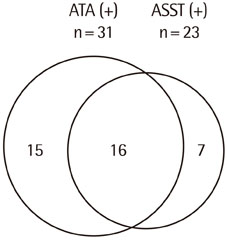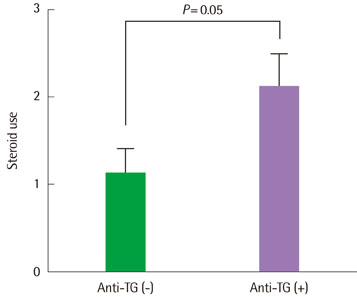Thyroid autoantibodies and the prognosis of chronic idiopathic urticaria
- Affiliations
-
- 1Department of Internal Medicine, Seoul National University College of Medicine, Seoul, Korea. helenmed@snu.ac.kr
- 2Institute of Allergy and Clinical Immunology, Seoul National University Medical Research Center, Seoul, Korea.
- 3Department of Internal Medicine, Chung-Ang University College of Medicine, Seoul, Korea.
- KMID: 2261863
- DOI: http://doi.org/10.4168/aard.2013.1.2.151
Abstract
- PURPOSE
Chronic urticaria is a common disease, but clinically, it is not easy to treat and predict the prognosis since the causes and pathophysiology of chronic urticaria remain unknown. Many studies have been done that defined the association between chronic urticaria and thyroid autoimmunity. However, the clinical role of antithyroid antibodies (ATAs) has not been fully evaluated.
METHODS
We retrospectively reviewed the medical records of patients with chronic urticaria and compared the duration of treatment, the frequency of steroid use, and the level of medications used in the treatment of urticaria according to the presence or absence of ATAs including the antithyroglobulin (anti-TG) antibody, antithyroid peroxidase antibody, and antithyrotropin-stimulating hormone receptor antibody.
RESULTS
A total of 194 patients with chronic urticaria was enrolled; of which, 108 patients were free of ATAs and 86 patients had at least one ATA. The treatment duration was significantly longer in the anti-TG antibody-positive patients compared to the patients without ATAs (39.6+/-10.2 months/18.0+/-3.4 months, P=0.02). The patients with the anti-TG antibody also showed more frequent steroid use than that of the patients without the anti-TG antibody (2.1+/-0.4/1.1+/-0.3, P=0.05). The level of medications used to achieve control of urticaria tended to be higher in patients with the anti-TG antibody than in the ATA-negative patients group.
CONCLUSION
From this study, we suggest that the evaluation of thyroid autoantibodies, especially the anti-TG antibody, can be a useful tool in predicting the prognosis and making decisions for the treatment strategy of patients with chronic urticaria.
Keyword
MeSH Terms
Figure
Cited by 6 articles
-
Effect of Levothyroxine Treatment on Clinical Symptoms in Hypothyroid Patients with Chronic Urticaria and Thyroid Autoimmunity
Do Hun Kim, Nam Hee Sung, Ai Young Lee
Ann Dermatol. 2016;28(2):199-204. doi: 10.5021/ad.2016.28.2.199.Natural History of Chronic Urticaria in Korea
Bo Young Chung, Ji-young Um, Seok Young Kang, Hye One Kim, Chun Wook Park
Ann Dermatol. 2020;32(1):38-46. doi: 10.5021/ad.2020.32.1.38.Chronic idiopathic urticaria and antithyroid autoantibodies
Jae-Hyun Lee
Allergy Asthma Respir Dis. 2013;1(2):103-104. doi: 10.4168/aard.2013.1.2.103.KAAACI Work Group report on the management of chronic urticaria
Young-Min Ye, Gwang Cheon Jang, Sun Hee Choi, Jeongmin Lee, Hye-Soo Yoo, Kyung Hee Park, Meeyong Shin, Jihyun Kim, Suh-Young Lee, Jeong-Hee Choi, Youngmin Ahn, Hae-Sim Park, Yoon-Seok Chang, Jae-Won Jeong, Sooyoung Lee,
Allergy Asthma Respir Dis. 2015;3(1):3-14. doi: 10.4168/aard.2015.3.1.3.Chronic urticaria treated with tacrolimus
Ho-Chul Jung, Dong-Hyun Lee, Hyun-Sun Park, Ho-Jin Lee, Jae-Woo Kwon
Allergy Asthma Respir Dis. 2014;2(5):391-393. doi: 10.4168/aard.2014.2.5.391.Factors associated with the treatment of chronic spontaneous urticaria in children
Sun-Young Cho, Yun-Chang Choi, Byoung-Gwon Kim, Jin-A Jung
Allergy Asthma Respir Dis. 2017;5(4):211-216. doi: 10.4168/aard.2017.5.4.211.
Reference
-
1. Zuberbier T, Asero R, Bindslev-Jensen C, Walter Canonica G, Church MK, Gimenez-Arnau A, et al. EAACI/GA(2)LEN/EDF/WAO guideline: definition, classification and diagnosis of urticaria. Allergy. 2009; 64:1417–1426.
Article2. Najib U, Sheikh J. The spectrum of chronic urticaria. Allergy Asthma Proc. 2009; 30:1–10.
Article3. Grattan CE, Humphreys F. British Association of Dermatologists Therapy Guidelines and Audit Subcommittee. Guidelines for evaluation and management of urticaria in adults and children. Br J Dermatol. 2007; 157:1116–1123.
Article4. Fernando S, Broadfoot A. Chronic urticaria: assessment and treatment. Aust Fam Physician. 2010; 39:135–138.5. Posthumus J, Tinana A, Mozena JD, Steinke JW, Borish L. Autoimmune mechanisms in chronic idiopathic urticaria. J Allergy Clin Immunol. 2012; 130:814–816.e4.
Article6. Kulthanan K, Jiamton S, Thumpimukvatana N, Pinkaew S. Chronic idiopathic urticaria: prevalence and clinical course. J Dermatol. 2007; 34:294–301.
Article7. Charlesworth EN. Urticaria and angioedema. Allergy Asthma Proc. 2002; 23:341–345.
Article8. Eckman JA, Hamilton RG, Gober LM, Sterba PM, Saini SS. Basophil phenotypes in chronic idiopathic urticaria in relation to disease activity and autoantibodies. J Invest Dermatol. 2008; 128:1956–1963.
Article9. Sabroe RA, Grattan CE, Francis DM, Barr RM, Kobza Black A, Greaves MW. The autologous serum skin test: a screening test for autoantibodies in chronic idiopathic urticaria. Br J Dermatol. 1999; 140:446–452.
Article10. Levy Y, Segal N, Weintrob N, Danon YL. Chronic urticaria: association with thyroid autoimmunity. Arch Dis Child. 2003; 88:517–519.
Article11. Verneuil L, Leconte C, Ballet JJ, Coffin C, Laroche D, Izard JP, et al. Association between chronic urticaria and thyroid autoimmunity: a prospective study involving 99 patients. Dermatology. 2004; 208:98–103.
Article12. Palma-Carlos AG, Palma-Carlos ML. Chronic urticaria and thyroid auto-immunity. Eur Ann Allergy Clin Immunol. 2005; 37:143–146.13. Konstantinou GN, Asero R, Maurer M, Sabroe RA, Schmid-Grendelmeier P, Grattan CE. EAACI/GA(2)LEN task force consensus report: the autologous serum skin test in urticaria. Allergy. 2009; 64:1256–1268.
Article14. Zuberbier T, Asero R, Bindslev-Jensen C, Walter Canonica G, Church MK, Giménez-Arnau AM, et al. EAACI/GA(2)LEN/EDF/WAO guideline: management of urticaria. Allergy. 2009; 64:1427–1443.15. Hide M, Francis DM, Grattan CE, Barr RM, Winkelmann RK, Greaves MW. The pathogenesis of chronic idiopathic urticaria: new evidence suggests an auto-immune basis and implications for treatment. Clin Exp Allergy. 1994; 24:624–627.
Article16. Kaplan AP. Chronic urticaria: pathogenesis and treatment. J Allergy Clin Immunol. 2004; 114:465–474.
Article17. Leznoff A, Josse RG, Denburg J, Dolovich J. Association of chronic urticaria and angioedema with thyroid autoimmunity. Arch Dermatol. 1983; 119:636–640.
Article18. Hollowell JG, Staehling NW, Flanders WD, Hannon WH, Gunter EW, Spencer CA, et al. Serum TSH, T(4), and thyroid antibodies in the United States population (1988 to 1994): National Health and Nutrition Examination Survey (NHANES III). J Clin Endocrinol Metab. 2002; 87:489–499.
Article19. Engler H, Riesen WF, Keller B. Anti-thyroid peroxidase (anti-TPO) antibodies in thyroid diseases, non-thyroidal illness and controls. Clinical validity of a new commercial method for detection of anti-TPO (thyroid microsomal) autoantibodies. Clin Chim Acta. 1994; 225:123–136.
Article20. Mariotti S, Caturegli P, Piccolo P, Barbesino G, Pinchera A. Antithyroid peroxidase autoantibodies in thyroid diseases. J Clin Endocrinol Metab. 1990; 71:661–669.
Article21. Mozena JD, Tinana A, Negri J, Steinke JW, Borish L. Lack of a role for cross-reacting anti-thyroid antibodies in chronic idiopathic urticaria. J Invest Dermatol. 2010; 130:1860–1865.
Article22. Bagnasco M, Minciullo PL, Saraceno GS, Gangemi S, Benvenga S. Urticaria and thyroid autoimmunity. Thyroid. 2011; 21:401–410.
Article23. Leznoff A, Sussman GL. Syndrome of idiopathic chronic urticaria and angioedema with thyroid autoimmunity: a study of 90 patients. J Allergy Clin Immunol. 1989; 84:66–71.
Article24. Ryhal B, DeMera RS, Shoenfeld Y, Peter JB, Gershwin ME. Are autoantibodies present in patients with subacute and chronic urticaria? J Investig Allergol Clin Immunol. 2001; 11:16–20.25. Zauli D, Deleonardi G, Foderaro S, Grassi A, Bortolotti R, Ballardini G, et al. Thyroid autoimmunity in chronic urticaria. Allergy Asthma Proc. 2001; 22:93–95.
Article26. Kikuchi Y, Fann T, Kaplan AP. Antithyroid antibodies in chronic urticaria and angioedema. J Allergy Clin Immunol. 2003; 112:218.
Article27. Fernandez Romero DS, Malbran A. Chronic urticaria with alterations of the thyroid function and thyroid peroxidase antibodies. Medicina (B Aires). 2005; 65:231–234.28. Gaig P, Garcia-Ortega P, Enrique E, Richart C. Successful treatment of chronic idiopathic urticaria associated with thyroid autoimmunity. J Investig Allergol Clin Immunol. 2000; 10:342–345.29. Cebeci F, Tanrikut A, Topcu E, Onsun N, Kurtulmus N, Uras AR. Association between chronic urticaria and thyroid autoimmunity. Eur J Dermatol. 2006; 16:402–405.
- Full Text Links
- Actions
-
Cited
- CITED
-
- Close
- Share
- Similar articles
-
- Prognostic Significance of Thyroid Autoantibodies in Urticaria
- Chronic idiopathic urticaria and antithyroid autoantibodies
- Clinical aspects of chronic urticaria in children
- Effect of Levothyroxine Treatment on Clinical Symptoms in Hypothyroid Patients with Chronic Urticaria and Thyroid Autoimmunity
- The clinical significance of thyroid auto-antibodies in patients with chronic idiopathic urticaria




